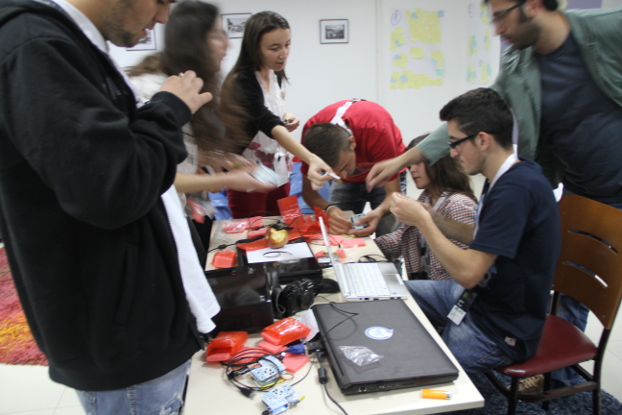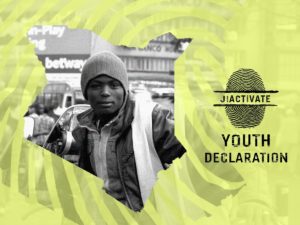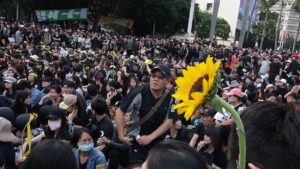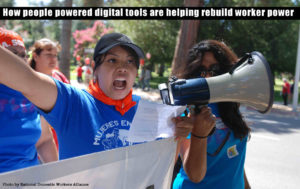The Republic of Kosovo has a pollution problem. During the winter, when the local lignite power plants are working over time, the air becomes visible. Particulate glistens in the streetlights, everything is covered in a grey film. Kosovo is considered the most polluted country in Europe.
The Kosovo Environmental Protection Agency (KEPA) does what it can to test air quality with only three dedicated staff. However, this makes the data limited and at times spotty. In this absence, UNICEF’s Kosovo Innovation Lab is organising local youth to collect pollution data and advocate for a cleaner Kosovo. The project is called Science for Change.
Tasked with reimagining UNICEF for a modern world, UNICEF’s Innovation Labs are leveraging ubiquitous technology to solve problems affecting children and mothers. In Sudan this meant deploying rapid SMS to improve birth registration, in Zambia they are using cell phones to provide real time information on HIV and STIs, and in Kosovo they are tackling pollution.
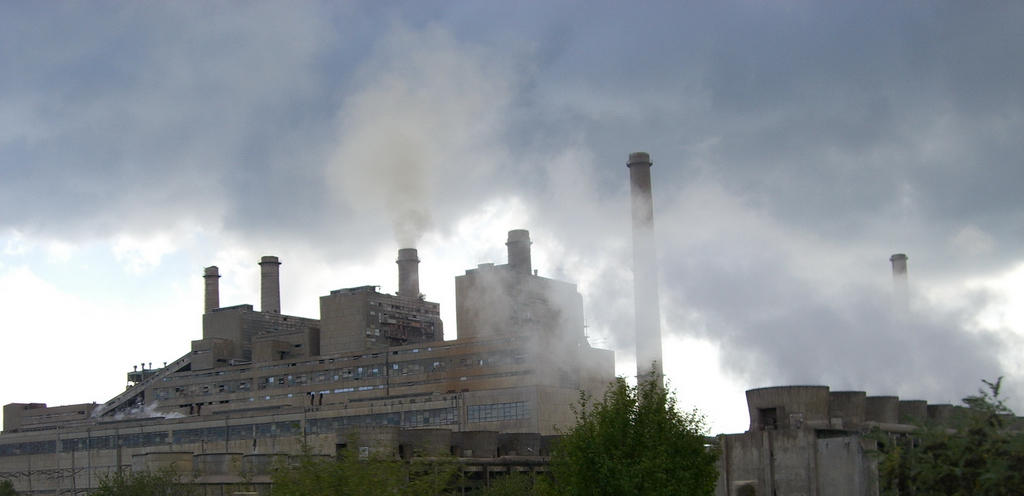
Power plants in near Pristina, Kosovo. The nation is considered the most polluted in Europe. Photo by Shkumbin Saneja. CC BY-SA 3.0 via Wikimedia Commons.
Youth setting the agenda
“What we do has to be locally impactful,” says Josh Harvey, a lead at UNICEF’s Kosovo Innovation Lab. “We want to make sure that [local youth] own the project and steer it,” Harvey continued. In fact, while the Innovation Lab will provide support and training, young people set the agenda; and young people in Kosovo want to see a cleaner environment.
It makes sense to be organising young people in Kosovo. Ron Salaj, the coordinator of Science for Change, points to the UNICEF Kosovo programme’s Youth Opinion Poll conducted in 2010 that found half of Kosovo’s population was 25 years old or younger. This makes Kosovo the youngest country in Europe, yet young people have decidedly been left out of the decision making process. “We wanted to take advantage of this potential and give Kosovo’s young people tools, knowledge, methods, and opportunity to speak up for one of the Kosovo’s most challenging issues – environmental pollution,” continues Salaj.
The Science for Change project, with support from Internet Artizans, Transitions Online and Czech Ministry of Foreign Affairs, is simultaneously teaching local youth about environmental policy issues, how to collect pollution data, and how to use this data to advocate for change. Less than a year old, the youth participants have gone through a training that covered everything from how to use social media for advocacy to how to collect and publish open pollution data.
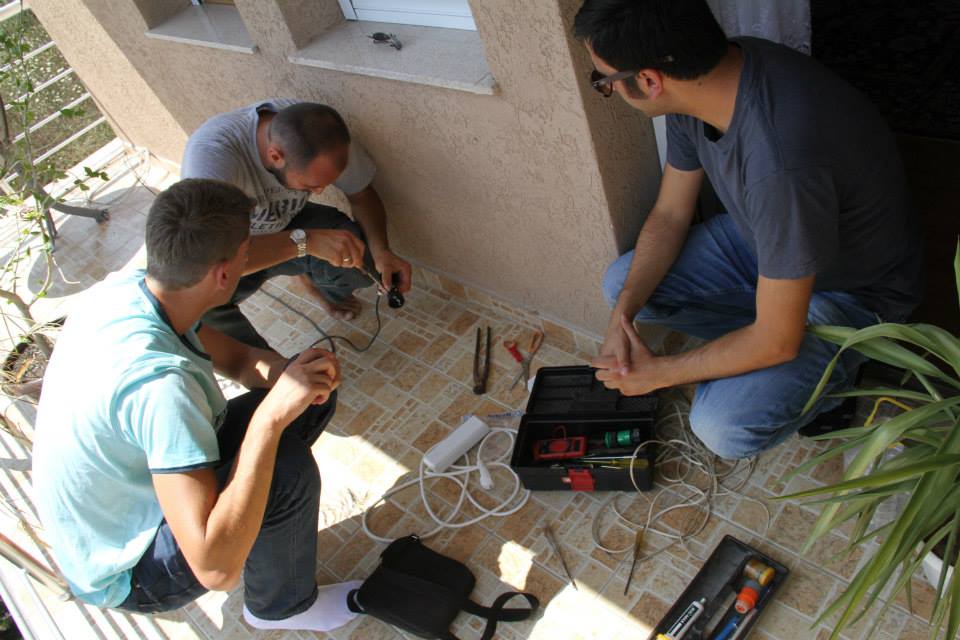
Deploying and testing air quality monitoring kits in Pristina, August 2014. Photo via Citizen Science Kosovo.
Open data aims to empower youth and government
The advocacy work in Kosovo is intended to build off of successful campaigns around the world. The training took examples from an anti-fracking campaign in Pennsylvania, the Extreme Citizen Science Research Group in London, and the Greenpeace Palm oil campaign. The youth were trained to use simple pollution collection tools like ghost wipes and diffusion tubes and also learned open source data software from Smart Citizen. The Smart Citizen Kit democratizes the data collection process by being low cost, easy to use, and come with a visualization API that makes the data accessible.
When asked about the limitations of this technology, Harvey says “Going into this, we knew what we could do and what we couldn’t do. The technology is reliable, and we are looking for trends.” Harvey goes on to clarify that they never approached this project to say something definitive about pollution in Kosovo, but wanted to empower youth to have a seat at the table and to inform the dialogue around environmental issues.
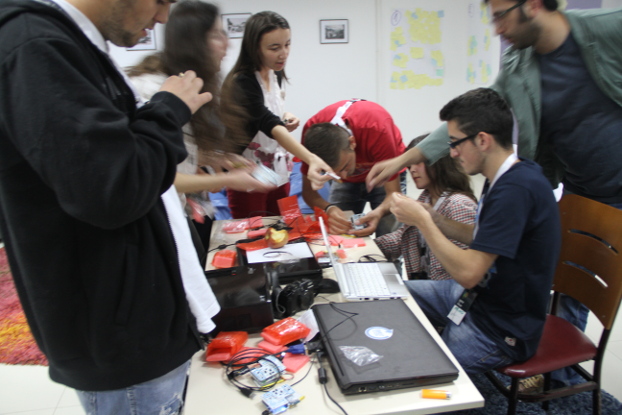
Youth putting together low cost digital monitors developed by SmartCitizen and based on the open-source hardware board Arduino. The monitors enable real-time monitoring of carbon monoxide and nitrogen dioxide, in addition to temperature, sound levels and humidity.
The Kosovar government started to address environmental issues by passing a number of laws, including the implementation of E.U. air quality standards. But passing laws is not enough, as enforcement remains poor. Salaj says this is why Science for Change needs to happen, “[Our] vision is to support, encourage, and hold accountable Kosovo’s institutions when it comes to air quality monitoring and transparency.”
In fact, the Kosovar government welcomes the project. Letafete Latifi, the director of KEPA’s Hydro-meteorological Institute, which is tasked with air monitoring, was a consultant for last year’s Science for Change training. Ms. Latifi hopes that Science for Change continues because it creates new, reliable data to bolster KEPA’s existing data collection. She also thinks it is a positive force in civil society. Ms. Latifi expounded, “Civil society is often regarded as the opposition, but the cooperation between the institute and Innovations Lab is an example of how the government and civil society can work together to deliver results beneficial for the citizens of Kosovo.”
Working with the government of Kosovo was a part of the plan all along. Salaj explains that, “There is some data being collected by Kosovo’s Ministry of Environment and Institute for Public Health, but this data is either closed in the Ministry’s database or selectively disclosed in not understandable or accessible formats.” Having KEPA at the table alongside local citizens, NGOs, and technologists allow the group to collaboratively confront and develop variety of ideas, share best practices, and contribute to the project’s outcome.
Innovating and iterating the Science for Change program
While Kosovo’s environmental problems are large, they are not unique. Harvey is quick to point out that Innovation Lab field offices, like the one in Kosovo, are looking to both improve local conditions but also to create a robust and flexible project that can work else where. He says that Jakarta, the densely populated capital of Indonesia, is already interested in iterating Science for Change.
Back in Kosovo, Salaj is excited about what can be accomplished from collaborative citizen science. “[Citizen Science is] participatory, bottom-up, agile and capitalizes on the growing acceptance of open-source technologies (like open data and hardware and low-cost internet connected devices) to empower community members to drive actions around issues impacting their neighborhoods.” Salaj concludes on a hopeful note, “All these elements are difficult to be introduced and inserted into conservative, hierarchical institutional science, while in citizen science they become the core elements of it.”
Thanks to Fjolla Kondirolli for her help interviewing and translating.
Categories:
tech, tools and tactics